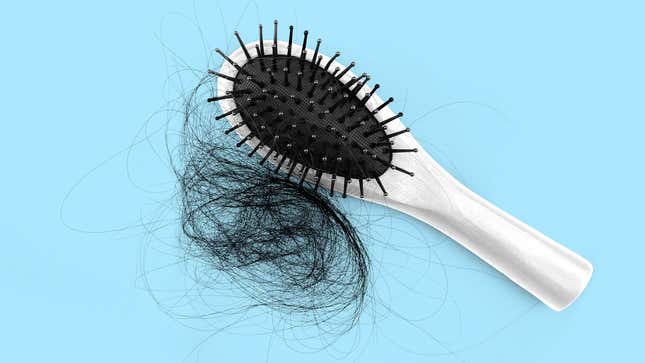
An experimental treatment for a condition that can cause widespread hair loss is close to the finish line. Recently published data from two Phase III trials has shown that baricitinib can help substantially regrow the hair of some patients with alopecia areata. The findings will likely pave the way for the Food and Drug Administration to approve a new use for baricitinib, which is already a common treatment for certain joint diseases like rheumatoid arthritis.
Alopecia areata is an autoimmune condition that causes people to suddenly lose hair, usually before the age of 40. The degree of hair loss can vary from person to person, with some losing patches of hair from their scalp while others may lose all their body hair entirely. Sufferers can sometimes regain their hair, even without treatment, but not always. It’s thought to affect around 7 million people in the U.S.
The condition is caused by an overactive immune system that attacks hair follicle cells. Over the years, studies have suggested that this dysfunction involves a family of proteins called janus kinases (JAK). And because there are already approved drugs that can inhibit JAK, often used to help treat other immune-related diseases, some researchers have looked into whether these JAK inhibitors could reverse the symptoms of alopecia areata.
There have been isolated case studies and small trials showing success with these drugs for years now. But the FDA generally requires positive data from two or more large clinical trials before it will approve a new drug or a new use for an existing drug. These latest results, published this month in the New England Journal of Medicine, seem to provide just that.
The data comes from two separate Phase III trials, collectively involving around 1,200 adult patients with severe alopecia areata who had lost half or more of their scalp hair. These volunteers were sorted into three groups, with two groups receiving a different oral dose of baricitinib and the third a placebo for 36 weeks. By the end of the study period, both treatment groups experienced an improvement in symptoms over the placebo, but those in the higher-dose baricitinib group fared better, with around a third regaining a large degree of their hair. You can see before-and-after images in this release from YaleNews.
These drugs may not help all cases of alopecia areata, and they’re certainly not risk-free. Because they inhibit an aspect of the immune system, they can raise the risk of serious infections. In the trials, patients taking the drug also had higher rates of acne and higher blood cholesterol levels. But they would still represent an important step forward, since there are no currently approved treatments for the condition.
“This is so exciting, because the data clearly show how effective baricitinib is,” said lead study author Brett King, an associate professor of dermatology at the Yale School of Medicine, in a statement. “These large, controlled trials tell us that we can alleviate some of the suffering from this awful disease.”
The trials were funded by Eli Lilly, the developers of baricitinib. In 2020, the company won a breakthrough designation for the drug in treating alopecia areata from the FDA, a label meant to speed along the review process of drugs for conditions with few or no available treatments. So it may not take long for the FDA to render its verdict on baricitinib, though there will need to be follow-up data on these patients to confirm the efficacy and safety of the treatment. Clinical trials of other existing and newly developed JAK inhibitors for alopecia areata are ongoing as well.